ClearURLs is an anti-tracking web extension that I have been using it for a long time, and reviewed it at the blog nearly 2 years ago. It is one of many privacy related add-ons that I use along with UBlock Origin, Multi-Account Containers, to name a few.
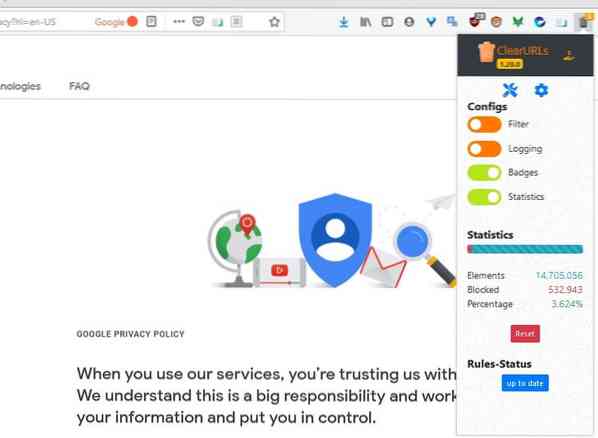
I came across a thread on reddit's Firefox sub yesterday, where I learned that ClearURLs has been removed from the Google Chrome Webstore.
As a long time user, I was naturally curious, and also slightly alarmed. Was there a reason for me to be worried? That's when I headed to the add-on's official GitHub page, where a user had raised an issue regarding the extension's absence.
For those unaware, here's a gist of what the add-on does. Its primary feature removes tracking elements from URLs. This is usually the extra part of a link that is completely unnecessary for you to visit and view the page that is being linked to. You may have seen really long URLs that takes you from one website to another, which is quite common when referral links are used. A website that wants to earn some commission for a product that it is affiliated with, adds a trackable link, for which it is paid a compensation fee. That is not exactly our problem, the issue is the landing page knows where you came from, which in layman's terms boils down to online tracking. This is a violation of your privacy, and it also happens when you click on ads.
Oh, and I should point out that ClearURLs is one of the extensions recommended by Mozilla. So, a privacy-focused organization loves it, while a company that relies heavily on online advertisements for its revenue removes it. Gee, I wonder who I should trust!
Here's the link to the Webstore page in question. I digress.
Let's see why the extension was removed from the Webstore. The response from the developer, Kevin Roebert, sheds some light on the issue. He has posted a screenshot of the message he received from Google, it's in German.
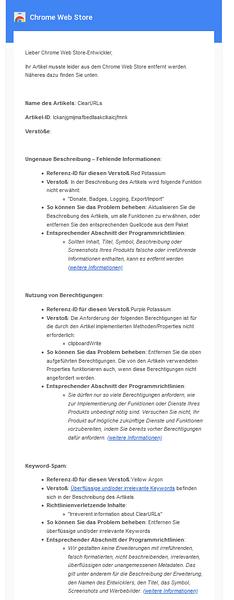
He states that the reviewer who removed the extension claimed that the description of the add-on is too detailed, and that is a violation of the Chrome Web Store's policies. Wait, what? Yes, you read that correctly. Well this does sort of explains why we see the extensive change-logs we see every so often with the "Bugs fixed" or "New features were added." They don't want to tell us what they did, because we may not like it.
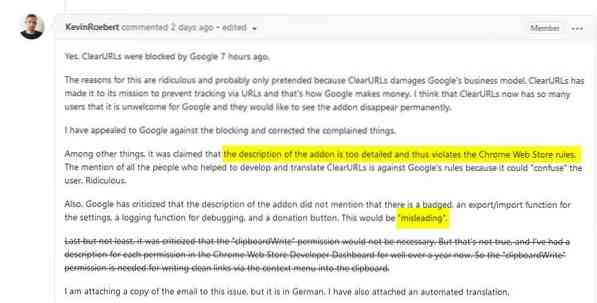
Apparently, ClearURLs' description was so good that it could confuse the user. That is pure gold, isn't it? Among other claims the removal notice states that the extension is misleading because it has an export/import button (used for the settings), a built-in option for logging and debugging.
The translated text (attached on GitHub) from the reviewer tells that the developer has not provided descriptions of what the buttons in the add-on's interface do. Is that a reason to ban an extension?
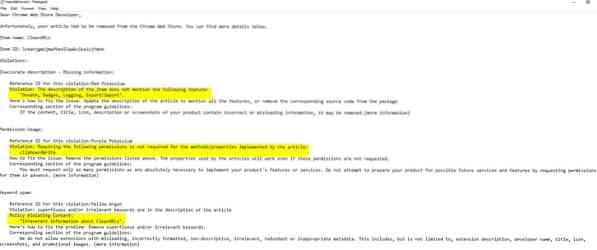
The ClipBoardWrite permission mentioned in the above image has been deemed unnecessary and removed in the latest version of the add-on. According to a comment from Roebert, the permission wasn't being used at all, so that doesn't seem like a valid reason to remove the add-on either. The third violation makes no sense, how is ClearURLs providing misleading information about itself?
The developer has commented that the description was written based on suggestions made by Mozilla's press department, specifically so users can understand how the add-on works. You can go to the Firefox AMO where the extension still exists and read the description there (or check the screenshots below). The wording is quite extensive.
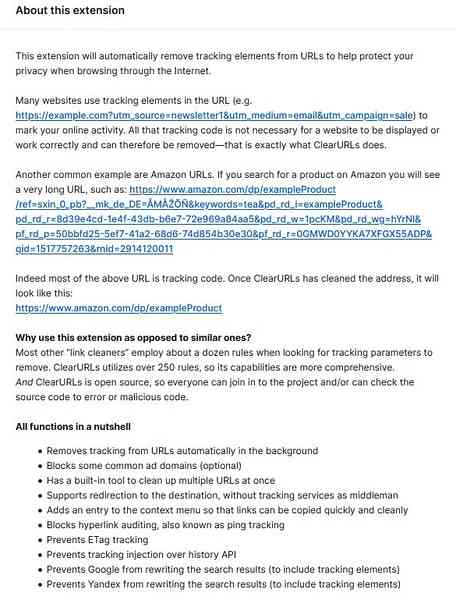
My guess is someone didn't like the penultimate line in the above image.
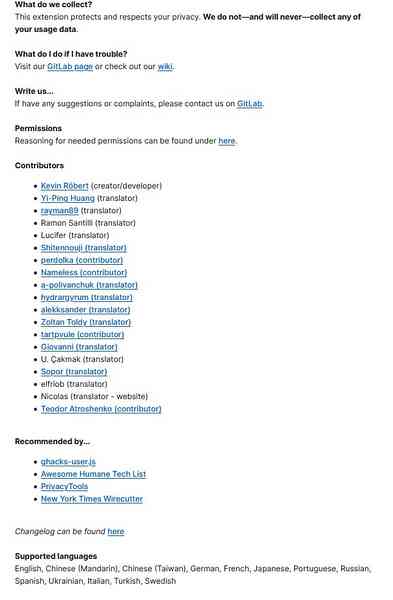
ClearURLs' developer says that the add-on's Webstore description had been used for over a year. So, why did Google remove it now and not earlier? Roebert's theory is that it is because the add-on has many users now and that it is hurting somebody's business. Here's an article that explains what data Google collects from you using Chrome.
Oh, and if you aren't aware of it, Google has enabled Manifest V3 in the beta version of Chrome. This controversial move could possibly be the end of ad-blockers for the browser. It may not be directly related to this article, but I just wanted to point out the general direction in which we are heading in terms of privacy.
There is a discussion on Hacker News that says ClearURLs could be used for potentially dangerous. Apparently, and I use this word because I'm not a developer, the extension allows arbitrary code execution aka targeted attacks if a filter list contained malicious stuff. The developer has responded to the issue in a comment on GitHub.
Comments on the GitHub issue suggest visiting the project's releases page, get the CRX file and drop it onto your browser's interface. This didn't work for many users (including me), the developer says that's because it is not signed by Google.
If you want a ClearURLs alternative, you want to take a look at NeatURL. You can also install it in Chrome directly from the GitHub page.
 Phenquestions
Phenquestions


